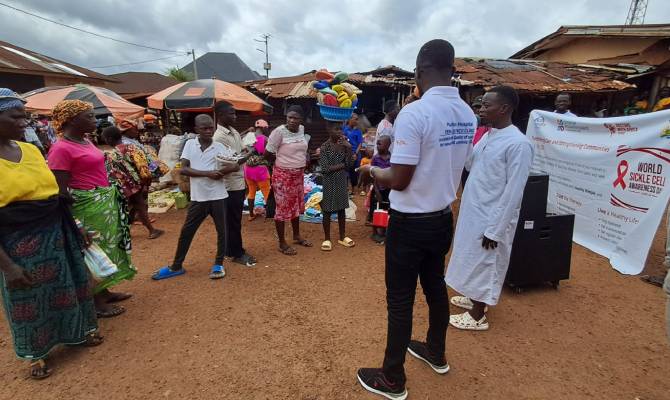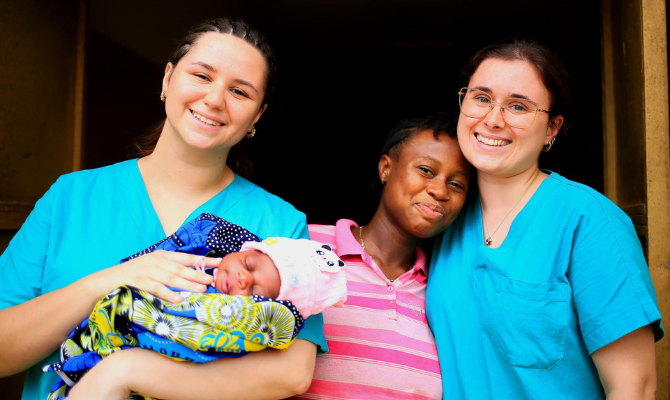Every year on June 19, the global community observes World Sickle Cell Disease Day—a vital opportunity to raise awareness of one of the most widespread yet often overlooked genetic blood disorders. Established by the United Nations in 2008, this day calls attention to the daily challenges faced by people living with sickle cell disease (SCD) and other haemoglobin disorders, emphasizes the importance of early diagnosis and quality care, and advocates for the implementation of effective prevention strategies.
Sickle Cell Diseases (SCD) is considered a non-communicable disease (NCD) along with the so called “Big Five”: cardiovascular diseases (including high blood pressure), cancer, lung diseases, diabetes, and mental health conditions. Such diseases are chronic conditions that are not spread from person to person and represent a growing public health concern in the African region.
In Sierra Leone NCDs contribute significantly to morbidity and mortality. Limited diagnostic and treatment facilities make early detection and effective management difficult. Many cases remain undiagnosed or mismanaged due to lack of awareness and healthcare resources. For that reason, CUAMM is actively engaged in Pujehun district through the PEN-Plus project. PEN-Plus is an integrated care delivery strategy focused on increasing the accessibility and quality of chronic care services for severe NCDs. Since 2023, CUAMM is supporting the General Hospital—the district’s main hospital—in providing free consultations and care for chronic patients in one of the 2 NCDs Clinics of Sierra Leone.
In this framework, CUAMM is committed to providing multidimensional support, which include, in addition to patient treatment, continuous training of hospital staff and supporting the government in integrating NCDs procedures into national policies. As well as that, the organization is active at the community level throughout the District to raise awareness and spread knowledge on NCDs.
Two years after the start of activities, the clinic registers over 1,000 enrolled patients who receive regular, specialized care and periodic follow-ups, ensuring them a better quality of life. More than half of these patients are being treated for hypertension and Sickle Cell Disease.
Sickle Cell Disease, a genetic blood disorder that causes chronic pain, organ damage, and frequent hospitalizations, is particularly widespread due to the high carrier rate in the population.
Blood disorders, also known as haemoglobin disorders are inherited blood diseases that affect how oxygen is carried throughout the body. These disorders fall mainly into two categories: sickle-cell disease and thalassaemia. Globally, approximately 5% of the population carries trait genes for haemoglobin disorders. Each year, over 300,000 babies are born with severe forms of these diseases. Although inherited from two generally healthy parents, these conditions can have serious health consequences.
Managing and Preventing the Burden
While the burden of haemoglobin disorders is significant, it can be effectively reduced through integrated management and prevention programmes. Disease management includes early diagnosis, regular monitoring, and comprehensive care. However, the most cost-effective approach combines treatment with prevention strategies, such as: carrier screening, genetic counselling and prenatal screening.

CUAMM’s Commitment in Pujehun
To mark this year’s World Sickle Cell Disease Day, CUAMM led a series of public awareness initiatives in Sierra Leone’s Pujehun district, where access to reliable health information is often limited. These included:
- Two radio talk shows, broadcast via community radio—an essential communication channel in rural areas—focusing on early detection, care options, and social support.
- An educational session at Pujehun Secondary School, empowering students with basic knowledge about symptoms, prevention, and the importance of seeking care.
- A street theatre performance in the central market, using local storytelling and drama to spread messages of awareness, empathy, and inclusion.
These activities highlight CUAMM’s ongoing commitment to supporting communities affected by sickle cell disease and promoting informed choices for healthier futures.





